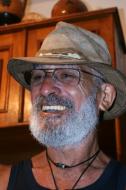Mestre No

“…Capoeira is the most dazzling choreography of the people of color. Beauty and wisdom form the basis of Capoeira. This is especially true about the Capoeira Angola: the style to which I have dedicated all my life.”
"Mestre No is not simply a capoeirista. He is Capoeira itself. Sometimes we watch him in the Roda and we cannot tell how he is making those motions. He lives Capoeira every day and every minute. Only a person who is with him all the time can notice this. Mestre No is Capoeira in the Roda and Capoeira in life. Talking with you or any other person, he is also doing Capoeira and in this very playing he is unique. He is a fantastic master; he is superb. I cannot even find the words to describe his mastery, this is why I say: Mestre No is Capoeira itself.” (Naldinho, a follower of Mestre No)
The greatness of mestre No is in his simplicity. I consider mestre No one of my teachers in Capoeira. 15 years ago he considerably influenced my understanding of Capoeira, revealing it as an art which possesses volume endowed with a place for everything and which, most importantly, cultivates the Human in the human being. He helped me realize that Capoeira is a great philosophy for understanding the world in which there is no place for upstarts and passers-by.
His full name is Norival Moreira de Oliveira. He was born on June 22, 1945, on the Itaparica island, in the state of Bahia, Brazil. He was four when he started learning Capoeira. His first teacher was his grandfather Olegario. Although his grandfather was not a professional, for No he became the first man to open the door to the world of Capoeira.
When No was seven his parents moved to Salvador. There they had as their neighbor the courageous street capoeirista mestre Nilton. He would take Norival to the street Roda of his master Mestre Pirró who used to organize Capoeira events with his own mestre Zeca.
Norival was only 19 when he was granted the title mestre by his master Nilton. Mestre No opened an academy which he called “Academia De Capoeira Angola Retintos.” In 1969 he created the “Academia de Capoeira Angola Orixas da Bahia,” which exists to this very day under the leadership of mestre Dinelson. In the 1970s mestre No took part in Rodas in Salvador, which were organized by mestre Waldemar and which attracted the famous masters of Capoeira Traira, Cobrinha Verde, Canjiquinha, etc.
Mestre No is often referred to as the “Master of masters”: he instructed thousands of capoeiristas, many of whom became renowned masters and professional instructors of Capoeira Angola. He visited many countries giving seminars and lectures: he used to teach in the USA for 18 years; he was in Russia, Canada, UK, and France and wherever he went he transmitted to his students the realization of Capoeira as an art of living. Today, mestre No lives in Boca do Rio, Salvador, Brazil, with his children and grandchildren.
Mestre No teaches that there are four basic principles in Capoeira, which comprise the ethical foundation of Capoeira Angola: respect, responsibility, safety, and freedom. These principles cannot define the art of Capoeira as such but they can demonstrate the other side of Capoeira where there is no intolerance, greed, arrogance, and reliance on unnecessary arguments. These principles can teach the most important lesson: the art of being a Human being.
